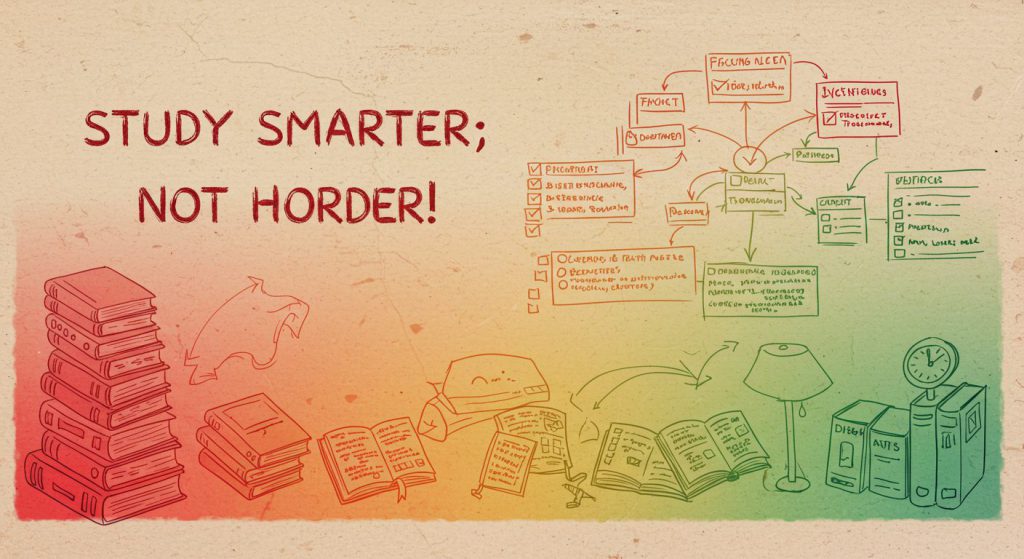As an academic, you probably have a lot on your plate, what with assignments, examinations, and perhaps even a side job or a hobby. Studying without effective methods can resemble an endless marathon with no endpoint. In this case, smart work is preferred over hard work, which brings us to study techniques backed by research. These methods have been transformed for use by a Cambridge medical student who developed innovative tips to help with learning any subject, be it biology, history, or even learning a new language. The intent here is to provide nine additional strategies aimed at improving active focus, confidence while studying, as well as retention levels. Feeling ready to upgrade your studying techniques? Then let’s begin!
1. Eat the Frog: Put the Tough Stuff at the Top of Your List
“Eat the frog” refers to avoiding a specific topic, only to come face to face with the topic later on and regret the avoidance, in this case on the eve of an examination. It suggests starting with the most challenging task, in this case your ‘frog’. Ask yourself: what’s the one topic I would terribly hate interacting with if my exam was tomorrow? This method emphasizes confronting problems head on which allows gaining momentum. The frog also represents the 80/20 rule, in which 80 percent of given results are obtained from 20 percent of efforts. Rather, focusing on the core concepts or the more difficult aspects of the subject like organic chemistry reactions or major historical facts will render positive results.
Tip: Every morning writes down and rank your top “frogs” for the day, which makes diving into the most complicated task first seem less daunting. As you tackle more complex challenges, watch your self-belief increase.
2. The Pomodoro Technique: Study in Short Intensified Segments
When studying for long hours, it often feels like trying to run through thick mud. The Pomodoro Technique approaches work differently by breaking everything down into shorter increments of intense focus that last about 25 minutes and are followed by short 5-minute breaks. This “time boxing” or “interval training” preserves mental acumen and prevents burnout. Other institutions like MIT with 50-minute study sessions paired with 10 minutes of rest suggest that it is entirely dependent on the individual and the specific subject at hand. If you are a literature fan, perhaps 50 minutes would be fine, however, those who find calculus challenging may struggle and would require 20-minute sprints instead. Tailoring your studying this way makes what once felt impossible actually fun and effortless.
Tip: Make use of Pomodoro timers and set specific goals for breaks to stay productive. During your off time, try treating yourself to a snack or recharge with some light physical activity.
3. Understand First, Memorize Later
Does memorizing facts sound familiar, only to forget them within a week? Building structures starts with setting up a foundation, likewise, prioritizing understanding builds a mental framework. Appreciate chemical bonds forming before types are memorized or comprehend causal relations to historical dates. This medical school and language teaching approach guarantees that through understanding, facts remain because they are anchored to a bigger picture.
Tip: Try summarizing a concept using your words before looking at the flashcards. If an explanation fails you, revisit the basics, because understanding is key.
4. Feynman Technique: Teach to Learn
Now, try picturing a friend who knows nothing explaining photosynthesis or the French Revolution. Teaching him requires astounding simplification which is the essence of Feynman’s approach, as it encourages understanding things deeply rather than memorizing. Whether alone, while talking into the mirror or teaching plush dolls, or with friends over coffee, knowledge gaps become exposed during teaching and cemented by what is already known.
Tip: After studying, explaining the topic in one paragraph will require refining until satisfactory for middle schoolers and repetition until satisfaction for accuracy.
5. Practice Testing: Quiz Your Way to Success
Revision or going through your notes on a topic might make you feel accomplished, but it’s like going for a warm up without playing the actual game. Active recall or retrieval practice, is self-testing with the help of quizzes or flashcards. “Practice Testing: A Simple Effective Strategy to Enhance Learning” sub-title report states that retention is improved by the release of neurochemicals that strengthens retention, even when responses are incorrect. For example, in sciences, make use of question banks available online, or for languages, make vocabulary flashcards. Answering questions fills in gaps of knowledge and checking answers makes it seem like a game.
Tip: Aim at answering 10 questions a day. Use flashcard-based apps like Quizlet and make your notes into flashcards that you can study on the go.
6. Spaced Repetition: Beat the Forgetting Curve
The human brain fails to retain newly acquired information without strategic review, but remembering information over time becomes easier. Leaving items for a while after reviewing with increasing gaps will help with long-term retention. Anki, the flashcard application, has enabled learners of every age to achieve long-term memory because it automates the showing you cards right before you forget. This tool is a lifesaver for memorizing vocabulary, formulas or simply medical jargon. Without technology, use ordinary flashcards manually.
Tip: Download Anki and for a difficult subject create 10 flashcards. Your aim should be to review them each day for a week and see the difference in how recall is retaining easily.

7. Hacks for Memorization: Use Mnemonics
Some facts like lists or specific terms can be very difficult to memorize. Personal connections, mind maps and mnemonic devices like acronyms for biology processes, can greatly help. To illustrate, remembering Spanish words through associating them with memories or drawing mind maps to visualize connections between problems in history. These methods make use of the emotional and visual parts of the brain, which helps in recall. Reconstructing mind maps from memory can also serve as active recall.
Tip: Construct a mnemonic for a list like causes of a particular disease or create five flash cards with personal stories attached to them.
8. Schedule Breaks: Create a Study Timetable
Lack of organization in studying resembles driving without a map. Setting aside specific times for studying, sleeping and meals streamlines and helps organize the brain for learning. Regular self-assessments allow learners to identify mastered topics and those requiring further focus. Avoid all-nighters as they have been found to hinder memory recall for days. Study periods and breaks can be scheduled separately with applications such as Google Calendar. This overall provides an organized framework conducive to healthy self-motivation to help maintain routine without excessive pressure.
Tip: Organize your week in a calendar application, marking study periods with specific colors. Ensure at least a single day is designated to allow for recovery.
9. Reassess and Adapt: Stay Flexible
Your educational journey will require shifts in your approach. Check-in on a regular basis: Are my methods yielding results? Am I prioritizing sleep? Taking time to evaluate yourself on a weekly basis helps you figure out what is ineffective, like switching from rereading to practice testing or scheduling self-care activities. It provides you the balance and productivity you need. As Einstein famously said, “doing the same thing over and over again and expecting different results is the definition of insanity.” So do not hesitate to change the methods and have fun exploring.
Tip: Every Sunday, set a timer for 10 minutes and write a journal entry detailing what is going well, what is not, and one actionable change you plan on implementing for the coming week.
Key Takeaways
- Eat the Frog: Start with tough tasks to boost efficiency and confidence.
- Pomodoro Technique: Study in short bursts to maintain focus and avoid burnout.
- Understand First: Build a mental model before memorizing for lasting retention.
- Feynman Technique: Teach concepts simply to deepen your understanding.
- Practice Testing: Use active recall to strengthen memory through quizzes.
- Spaced Repetition: Review strategically to lock info into long-term memory.
- Memorization Hacks: Use mnemonics and mind maps to make facts stick.
- Schedule with Rest: Create routines to stay consistent and balanced.
- Reassess and Adapt: Audit weekly to refine techniques and well-being.
Conclusion
Studying smarter doesn’t mean one-size-fits-all. Whether you love flashcards or thrive on teaching others, these nine techniques offer flexible ways to make learning efficient and even enjoyable. They’re like tools in a toolbox—pick what works for you, tweak as needed, and build a system that fits your life. The journey to better grades and deeper understanding starts with small, intentional steps. So, why not try one tip this week? Maybe eat a frog or test yourself with flashcards. Experiment, have fun, and watch your study sessions transform. You’ve got this!
